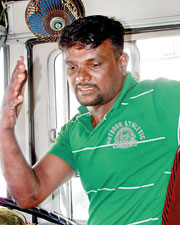News
Latest fuel price hike deepens consumer discontent
View(s):Yesterday’s move sparks angry reactions, writes Aanya Wipulasena and Skanda Gunasekara
Friday night’s fuel price increase has sparked strong reactions from the general public. The Ceylon Petroleum Corporation has raised by three rupees the price of a litre of 90-octane petrol, 95-octane petrol, and super diesel, while a litre of auto diesel has gone up by six rupees. These categories of fuel now cost Rs. 162, Rs. 170, Rs. 121 and Rs. 145 per litre respectively. Kerosene has gone up by four rupees and now sells at Rs. 115 per litre.

D. Gamini, Maggona resident and bus driver
Lanka IOC too has raised prices – a litre of 90 octane and 95 octane petrol is up by three rupees, but the price of diesel remains unchanged. Transport and food are two industries that will almost immediately feel the impact.
The Sunday Times spoke to a cross-section of the public, and most expressed annoyance at the price hike and said the Government was burdening the consumer with one economic burden on top of another.
“This job is getting harder by the day,” said Maggona resident D. Gamini, who drives a semi-luxury bus between Matara and Colombo. “Each time they raise the fuel price, we have to increase the bus fare. We charge more than the other buses, and when passengers get on board, many get off when they realise this is a semi-luxury vehicle. They cannot pay the extra.”
The father of two said the State should provide a fuel subsidy so that drivers would not have to increase bus fares and burden the public. Gemunu Wijeratne, president of the Sri Lanka Private Bus Owners’ Association, said private bus drivers should be given a subsidy. “We are lobbying for a fuel subsidy,” he said. “This is better than increasing our fares. If the Government ignores our request, we will be forced to take action. That means calling for a strike.”
The three-wheeler business is equally affected. M. Sharook, a driver from Maradana and father of three, said, “It was bad last year and this year it’ll be worse. It’s becoming almost impossible to maintain a family.”
Both three-wheelers and “budget taxis” will charge Rs 60 – Rs. 10 more – for the first kilometre, said a spokesman for the All Island Three Wheeler Drivers Union.
Sadamali Perera, a Dehiwala resident who works for the public sector, said prices keep soaring and middle-class families can “barely manage.” She said she takes a three-wheler “because it is quicker and safer”, but now travels by bus because she cannot afford a three-wheeler. “The Government should think of the average commuter before it takes such decisions,” she said. “The average citizen is badly affected by all these price increases.”
Car owners are also angry. M. Aslam of Nugegoda said he finds it increasingly hard to maintain a vehicle, and has had to cut down on travelling and trips.
Owners of restaurant and eateries are also complaining. Saman Kumara owns a boutique in Slave Island and delivers meals by three-wheeler. “This is how I live and support my family. I have two school-going children. Daily expenses are shockingly high.”
Arbitrary fuel price increases are unfair to the public, UNP Member of Parliament Dr. Harsha de Silva told the Sunday Times. “Sri Lanka is raising fuel prices while the global fuel market is showing decreasing prices,” MP de Silva said. “The Government has failed to maintain a fixed price in relation to international prices. We clearly see corruption and wastage continuing at the Ceylon Petroleum Corporation.”
The import of sub-standard fuel that had to be disposed of but still paid for is a clear instance of corruption, and all this has contributed to the latest price hike, the MP said.
It was only three months back, at midnight on December 14, that the Ceylon Petroleum Corporation raised the price of petroleum products by Rs. 10.
Follow @timesonlinelk
comments powered by Disqus
















